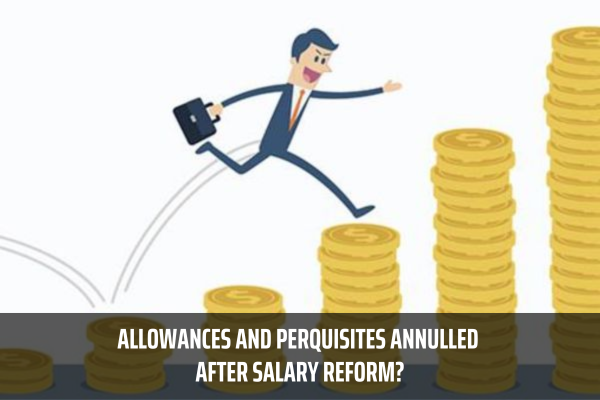From July 1, 2024, which allowances and perquisites will be annulled after salary reform in Vietnam under the Resolution 27?
From July 1, 2024, which allowances and perquisites will be annulled after salary reform in Vietnam under the Resolution 27?
Pursuant to Resolution 27-NQ/TW of 2018, the provisions regarding allowances and perquisites are as follows:
3. Reform content
3.1. For officials, public employees, and armed forces (public sector)
....
d) Rearrange the current allowances regime, ensuring that the total allowances fund accounts for a maximum of 30% of the total salary fund
....
- Annul seniority allowances (except for the military, police, and cipher positions to ensure salary parity with officials); leadership position allowances (as leadership positions in the political system determine position salaries); party and socio-political organization allowances; official duty allowances (as they have been incorporated into the base pay); hazardous and dangerous allowances (as hazardous and dangerous labor conditions have been included in allowances according to occupation).
...
III- TASKS, KEY SOLUTIONS
...
Resolutely implement financial and budgetary measures, considering it a breakthrough task to generate resources for salary policy reforms
....
- Annul non-salary payments for officials, public employees funded by the state budget, such as meeting perquisites, perquisites for drafting legal documents, projects, workshops... Implement lump sum salary funds associated with the goal of streamlining the organizational structure of agencies and units. Expand the mechanism of lump sum funding associated with the achievement of tasks. Do not link the salary level of officials, public employees to the construction, amendment, or supplementation of policies and regulations that do not have a salary nature. Study the regulations on non-salary benefits (cars, telephones, etc.). Only issue new policies and regulations when resources for implementation have been arranged and balanced.
...
Therefore, for the implementation of payrolls in 2024, the allowances and perquisites will be implemented as follows:
- The following allowances will be abolished:
+ Seniority allowances (except for the military, police, and cipher positions to ensure salary parity with officials);
+ Leadership position allowances (as leadership positions in the political system determine position salaries);
+ Party and socio-political organization allowances;
+ Official duty allowances (as they have been incorporated into the base pay);
+ Hazardous and dangerous allowances (as hazardous and dangerous labor conditions have been included in allowances according to occupation).
- The following perquisites or non-salary payments funded by the state budget for officials, public employees will be abolished:
+ Meeting perquisites;
+ Perquisites for drafting legal documents, projects, workshops...
In addition, for non-salary payments outside the state budget, the following measures will be implemented:
+ Implement lump sum salary funds associated with the goal of streamlining the organizational structure of agencies and units.
+ Expand the mechanism of lump sum funding associated with the achievement of tasks.
+ Do not link the salary level of officials, public employees to the construction, amendment, or supplementation of policies and regulations that do not have a salary nature.
+ Study the regulations on non-salary benefits (cars, telephones, etc.).
+ Only issue new policies and regulations when resources for implementation have been arranged and balanced

From July 1, 2024, which allowances and perquisites will be annulled after salary reform in Vietnam under the Resolution 27?
New payrolls to be formulated after salary reform in Vietnam?
Pursuant to Resolution 27-NQ/TW of 2018, the officials' payrolls will be divided into 03 payrolls for the following groups:
(1) Develop a payroll for leadership positions, applicable to officials and public employees holding leadership positions (elected and appointed) within the political system from central to local levels, based on the following principles:
+ The salary level must reflect the hierarchy within the political system. Those holding leadership positions will receive salaries according to their positions. If a person holds multiple positions, they will receive the highest salary level for these positions. Those holding equivalent leadership positions will receive equal salaries. The salary level of higher-level leaders must be higher than that of lower-level leaders.
+ Establish a salary level for each type of equivalent position. Do not classify ministries, sectors, committees, commissions, and equivalent units at the central level when building the central-level leadership payrolls. Do not differentiate the salary level for the same leadership position based on the classification of local administrative units, which is implemented through the allowances regime. The classification of equivalent leadership positions within the political system for designing leadership payrolls will be decided by the Politburo after reporting to the Central Executive Committee.
(2) Develop a professional and technical payroll based on the civil service ranks and professional job titles for public employees who do not hold leadership positions. Each civil service rank and professional job title will have multiple salary levels based on the principle that jobs with the same level of complexity will have the same salary level.
+ Conditions of higher labor requirements and occupational benefits will be implemented through the allowances regime based on the occupation.
+ Rearrange the job groups and the number of salary levels within the civil service ranks and professional job titles, and encourage civil servants and public employees to improve their professional and technical qualifications.
+ Appointment to a civil service rank or professional job title must be related to the job position and the civil service rank and professional job title structure implemented by the managing agency or unit.
(3) Develop three payrolls for the armed forces, including:
+ 01 payrol applicable to military officers, officers and non-commissioned officers in the police force (based on positions, ranks, or military ranks).
+ 01 payrol applicable to professional servicemen, technical personnel in the police force.
+ 01 payrol applicable to defense workers, defense workers in the armed forces (ensuring the salary ratio between the armed forces and administrative civil servants as it currently stands).
What are the changes of salary structure for officials after salary reform in Vietnam?
Pursuant to the directives of Resolution 27-NQ/TW of 2018, the basic salary structure for officials will change according to the following formula:
Official's salary = Base pay + Allowances (if applicable) + Bonus (if applicable) |
Where:
Base pay: accounts for about 70% of the total salary fund
Allowances: account for about 30% of the total salary fund
Bonus: the bonus fund is about 10% of the total salary fund for the year, excluding allowances.
LawNet
